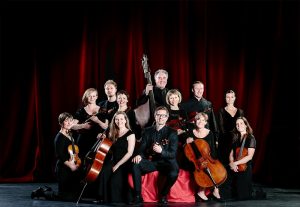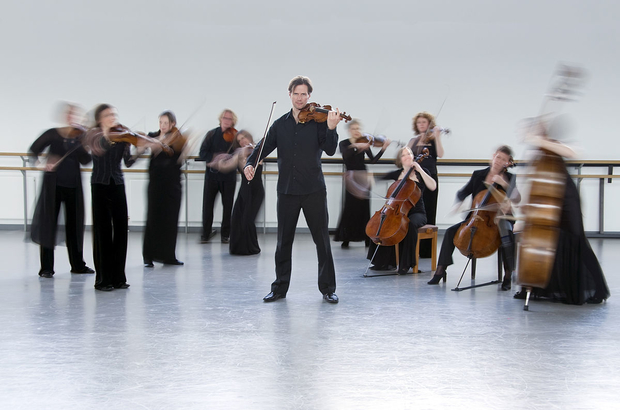DAN JACOBSON reviews string orchestra Scottish Ensemble’s performance at King’s Place.
High school concerts were always a sordid affair. They would invariably begin with a dispassionate school choir performing some sort of self-deprecating religious number, followed by a kid in Year 7 performing a Bach piano concerto as fast as was humanely possible. The evening would then conclude with the orchestra playing a depressingly uncharismatic piece by a modern British composer, probably Michael Tippett, with teachers playing the instruments that the students were not motivated enough to play themselves. I was lucky to get my own form of classical education from my father’s liking for Classic FM, and the procurement of cheap tickets to see the Halle Orchestra. But, from my perspective, high school concerts would too often alienate students from classical music and its surrounding world rather than inspire them.
Scottish Ensemble, the UK’s only professional string orchestra, is dedicated to reversing this process, reflected in their novel, forward-thinking attitude to engaging the public with classical music. This is demonstrated in all aspects of their performance, from playing standing up, allowing the audience to see the music materialised within the performers’ actions, to the use of tablets instead of sheet music, ‘turned’ via a foot pedal. Their choice of venue was also apt: King’s Place, which, whilst kitted out with two gorgeous halls, exudes more of an atmosphere of Tate Modern than the Royal Albert Hall. It provided a perfect backdrop for their unique repertoire.
Prophecy, their show inspired by classical retellings of Greek tragedy, was designed as a display of how music possesses the ability to describe an abstraction. The show began with a striking performance of Igor Stravinsky’s Apollon musagète: an apt decision, as explained by guest leader Matthew Truscott, due to Apollo’s status as the god of both music and prophecy. Music has a strong tendency to follow theoretical rules, and it was refreshing to see an orchestra of this calibre engaging in a thematic dialogue as well as a musical one.

The first half was anchored by a fantastic performance of Joseph Haydn’s Arianna a Naxos, a scena detailing the story of Ariadne who, after helping Theseus escape the Minotaur’s labyrinth, abandons her. Here, the orchestra, led by an impassioned vocal performance by Karen Cargill, displayed brilliant talent in conjuring the scenes of the story, from the ambience of ‘rosy dawn’, to a gripping climax, accompanied by broken, bombastic violins, as Cargill sings, ‘l piè vacilla, e in così amaro istante sento mancarmi in sen l’alma tremante’: ‘I cannot stand, my knees tremble, and the bitterness of this wretched moment makes my heart quiver in my breast.’
Cargill returned after the interval to perform the final aria from the opera Les Troyens, by Hector Berlioz. This was one of two descriptions, the other being extracts from Henry Purcell’s Dido and Aeneas, of the story of Dido, arguably the most emotionally devastating part of Virgil’s Aeneid, culminating in the Queen of Carthage sacrificing herself upon a funeral pyre of Aeneas’ belongings. Berlioz’s orchestration, propelled by warbling double bass and violin tremolo, created poignant images of thunderous skies, accompanying Cargill’s lament of love lost.
As a student, a ticket for this show would have cost £5, with similar prices available anywhere from the Barbican to the Proms. There is no real reason to explain the current lack of interest in classical music, other than maybe a stigma associated with privilege on the one hand, age on the other. What Scottish Ensemble demonstrated is that classical music is as vibrant and thrilling as any other type of music around. At the very least, it is refreshing to leave a concert venue without sore knees and tinnitus.
Featured image courtesy of wikipedia.org





